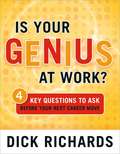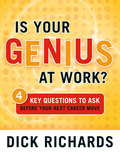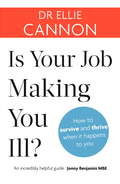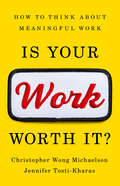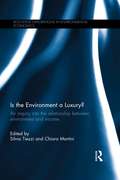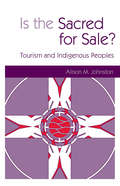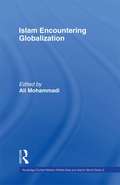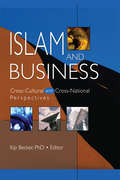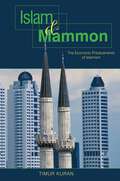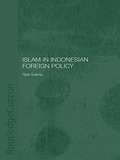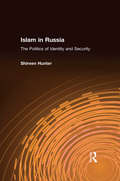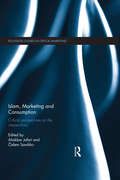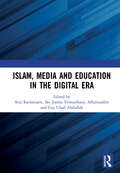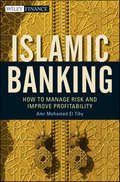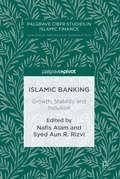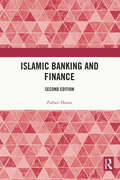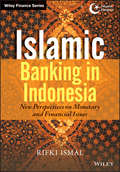- Table View
- List View
Is Your Genius at Work?: 4 Key Questions to Ask Before Your Next Career Move
by Dick RichardsBehind the experience and talents cataloged in your resume lies an intrinsic power that fuels your soul and your success: your genius. As ancient as the Greeks, as trendy as New Age, the concept of genius is fully grounded in contemporary life in this powerful journey of self-discovery that takes you right to the core of what makes you unique. Through dozens of compelling stories of people who have realized the transformative power of finding their genius?plus a wealth of practical exercises? Is Your Genius at Work? draws inspiring wisdom from ancient philosophies, spiritual traditions, modern sages, and the author?s twenty years of research and study to help you define and give name to your genius, recognize your life?s purpose, and discover how to bring your genius wholly alive through your life and work.
Is Your Genius at Work?: 4 Key Questions to Ask Before Your Next Career Move
by Dick RichardsBehind the experience and talents cataloged in your resume lies an intrinsic power that fuels your soul and your success: your genius. As ancient as the Greeks, as trendy as New Age, the concept of genius is fully grounded in contemporary life in this powerful journey of self-discovery that takes you right to the core of what makes you unique. Through dozens of compelling stories of people who have realized the transformative power of finding their genius—plus a wealth of practical exercises— Is Your Genius at Work? draws inspiring wisdom from ancient philosophies, spiritual traditions, modern sages, and the author’s twenty years of research and study to help you define and give name to your genius, recognize your life’s purpose, and discover how to bring your genius wholly alive through your life and work.
Is Your Job Making You Ill?: How to survive and thrive when it happens to you
by Dr Ellie Cannon'An incredibly helpful guide' Jonny Benjamin MBE'Groundbreaking . . . so relatable given the current way we approach our work' Amy Wall, Woman's WayWhat happens when the effects of work are far more detrimental to your wellbeing than a simple case of Sunday-night blues?Whether you're suffering from work-induced high blood pressure, depression, migraines, or panic attacks, Dr Ellie Cannon has the answer - and it's not quitting your job.We all have a moan about going to work: groaning about getting on the bus in the rush hour, counting down to the weekend. A gripe here and there is understandable and expected, but what happens when your job is making you mentally or physically unwell?When you are in this situation, it can be very difficult to know where to turn, who to speak to or where to find good quality help and advice. In Is Your Job Making You Ill?, Dr Ellie Cannon uses her decade of experience treating patients to create an essential resource for anybody suffering from job-related ill-health.Part one of the book lays out the key causes of job-related illness - from the pressure of an unmanageable workload to the challenges of an emotionally-draining job - and identifies the most common illnesses and symptoms which can occur as a result, including stress, anxiety, insomnia, high blood pressure and IBS.Part two will help you to find a way out. It includes a practical, self-directed programme that can be tailored to your individual circumstances, covering everything from where to find help, when (and if) to seek professional advice or take time off work, to micro-actions like improving your commute and adjusting your diet to support a healthy lifestyle.Work-related ill health can happen to anyone. This book is all about how to survive and thrive when it happens to you. Don't let your job rule your life anymore.
Is Your Job Making You Ill?: How to survive and thrive when it happens to you
by Ellie Cannon'An incredibly helpful guide' Jonny Benjamin MBE'Groundbreaking . . . so relatable given the current way we approach our work' Amy Wall, Woman's WayWhat happens when the effects of work are far more detrimental to your wellbeing than a simple case of Sunday-night blues?Whether you're suffering from work-induced high blood pressure, depression, migraines, or panic attacks, Dr Ellie Cannon has the answer - and it's not quitting your job.We all have a moan about going to work: groaning about getting on the bus in the rush hour, counting down to the weekend. A gripe here and there is understandable and expected, but what happens when your job is making you mentally or physically unwell?When you are in this situation, it can be very difficult to know where to turn, who to speak to or where to find good quality help and advice. In Is Your Job Making You Ill?, Dr Ellie Cannon uses her decade of experience treating patients to create an essential resource for anybody suffering from job-related ill-health.Part one of the book lays out the key causes of job-related illness - from the pressure of an unmanageable workload to the challenges of an emotionally-draining job - and identifies the most common illnesses and symptoms which can occur as a result, including stress, anxiety, insomnia, high blood pressure and IBS.Part two will help you to find a way out. It includes a practical, self-directed programme that can be tailored to your individual circumstances, covering everything from where to find help, when (and if) to seek professional advice or take time off work, to micro-actions like improving your commute and adjusting your diet to support a healthy lifestyle.Work-related ill health can happen to anyone. This book is all about how to survive and thrive when it happens to you. Don't let your job rule your life anymore.
Is Your Organization Capable of Disruptive Growth?
by Clayton M. Christensen Michael E. RaynorA surprising number of innovations fail because responsibility to build these businesses is given to managers or organizations whose capabilities aren't up to the task. This chapter offers a theory to guide executives as they choose a management team and build an organizational structure that together will be capable of constructing a successful new-growth business. The authors outline how these choices of managers and structure should vary by circumstance.
Is Your Work Worth It?: How to Think About Meaningful Work
by Jennifer Tosti-Kharas Christopher Wong MichaelsonWhat is work that&’s worth doing in a life worth living? A revealing exploration of the questions we ask and the stories we tell about our work. According to recent studies, barely a third of American workers feel &“engaged&” at work, and for many people around the world, happiness is lowest when earning power is highest. After a global pandemic that changed why, how, and what people do for a living, many workers find themselves wondering what makes their daily routine worthwhile. In Is Your Work Worth It?, two professors – a philosopher and organizational psychologist – investigate the purpose of work and its value in our lives. The book explores vital questions, such as: Should you work for love or money? When and how much should you work? What would make life worth living in a world without work? What kind of mark will your work leave on the world? This essential book combines inspiring and harrowing stories of real people with recent scholarship, ancient wisdom, arts, and literature to help us clarify what worthy work looks like, what tradeoffs are acceptable to pursue it, and what our work can contribute to society.
Is it (Still) Mostly Fiscal? Determinants of Sovereign Spreads in Emerging Markets
by Sanjeev Gupta Emanuele Baldacci Amine MatiA report from the International Monetary Fund.
Is the Environment a Luxury?: An Inquiry into the relationship between environment and income (Routledge Explorations in Environmental Economics)
by Silvia Tiezzi Chiara MartiniThe purpose of this collection of essays is to shed some light on the complex relationship between environmental quality and the distribution of income. Are the preferences of the poor towards a cleaner environment really different from those of the rich? Environmental economists have traditionally focused on efficiency issues. In their analyses the quality of the environment is usually related to aggregate or average variables, like per capita income; policy recommendations are usually formulated considering efficiency with no regard for equity and also the predicted effects of policies are evaluated in aggregate terms. The essays collected in this volume go into the problem of the relationship between environmental quality and income distribution. The book’s opening essay shows how different theories of economic growth and environmental quality seem to suggest that the higher the level of income the higher is the value of environmental protection. The essays that follow, a mix of already published papers and of papers solicited for this book, analyse the relationship between environmental quality and income distribution from different perspectives (both micro and macro) and on the basis of more than one methodology. This book highlights that the preferences of the poor towards a cleaner environment may differ from those of the rich, but income is also very likely to represent only one factor affecting them. The essays consider other relevant factors affecting preferences for environmental quality. What clearly emerges is that the distribution of costs and benefits of environmental policies is the key for their successful implementation, and that further research is needed to both address the distributional effects themselves and the strategies to mitigate them.
Is the Obesity Epidemic a Consequence of Rational Choices?: The Pitfalls of Free Markets
by Peter A. UbelMuch of the power of economics as a social science resides in its ability to reveal the logic underlying a wide range of human behaviors. Economists have developed mathematical tools that illuminate the kinds of cost-benefit calculations that influence people's choices. Indeed, economists have even done a good job of highlighting the rational choices that have contributed to something as problematic as the obesity epidemic. In this chapter, Peter Ubel provides a brief history of the theories behind the free market's assumption that obesity, and other harmful conditions and consumer behaviors, are the result of personal choices and, therefore, do not warrant public intervention. This chapter is excerpted from "Free Market Madness: Why Human Nature Is at Odds with Economics--and Why It Matters."
Is the PRGF Living Up to Expectations? An Assessment of Program Design
by Sanjeev Gupta Shamsuddin Tareq Gabriela Inchauste Mark Plant Benedict Clements Thomas Dorsey Emanuele Baldacci Nita ThackerThe creation of the Poverty Reduction and Growth Facility (PRGF) in late 1999 represented the culmination of more than two years of internal and external reviews and IMF policy discussions on the assessment and transformation of the Enhanced Structural Adjustment Facility (ESAF). The PRGF now functions as the IMF's principal instrument to support low-income countries in implementing their poverty reduction strategies. Targets and policies embodied in PRGF-supported programs should emerge from the country's own poverty reduction strategy, as laid out in its PRSP or Interim PRSP (I-PRSP). Key features which PRGF programs have in common were identified as follows: Broad participation and greater ownership; Embedding of the PRGF in the overall strategy for growth and poverty reduction; Budgets that are more pro-poor and pro-growth; Appropriate flexibility in fiscal targets ensured; More selective structural conditionality; Emphasis on measures to improve public resource management/accountability; Social impact analysis of major macroeconomic adjustments and structural reforms. The remainder of this paper provides an assessment of the extent to which PRGF-supported programs have implemented the individual key features.
Is the Sacred for Sale: Tourism and Indigenous Peoples
by Alison M Johnston'Definitely a book that sheds light on perspectives and perceptions about today's global economy. A must read for tourists and corporations alike - also heads of state, the media and environment groups - all of whom need to be informed on this key subject.' Chief Garry John, Chair and Spokesperson, St'at'imc Chiefs' Council 'an activist's call to action on behalf of people who have been made invisible in the merciless spread of globalization under corporate control.' Nina Rao, Southern Co Chair of the Tourism Caucus at the UN Commission on Sustainable Development, and Professor of Tourism 'A powerful and much-needed tool to fight the seemingly all-pervasive ignorance in the corporate and consumer-driven world that continues to hail ecotourism and other tourism 'alternatives' as beneficial to local people without looking at the root causes of problems.' Anita Pleumarom, Tourism Investigation and Monitoring Team, Bangkok Tourism is the fastest growing industry in the world. Ecotourism, often considered a more benign form of tourism, can in fact cause the most damage, as it targets more vulnerable environments and cultures. Is the Sacred for Sale? looks at our present crossroads in consumer society. It analyses the big questions of tourism, clarifying how tourism can support biodiversity conservation. It also offers a cross-cultural window to the divide between corporate thinking and sacred knowledge, to help us understand why collisions over resources and land use are escalating. Finally, we have a full spectrum of information for healthy dialogue and new relationships. This book is a profound wake up call to the business world and to decision-makers who shape current policy. It poses important questions to us all and is a must read for every tourist and traveller.
Islam Encountering Globalisation (Durham Modern Middle East and Islamic World Series #Vol. 2)
by Ali MohammadiOne of the greatest dilemmas facing Muslims today is the fact that Muslim culture is often seemingly incompatible with the culture of the modern Western world, and the features associated with it - technological progress, consumerism, and new electronic communication, all of which have the potential for a homogenizing effect on any culture. This book explores many key aspects of the globalisation process, discussing how Muslim countries are coping with globalisation, as well as considering how the West is responding to Islam.
Islam and Business: Cross-Cultural and Cross-National Perspectives
by Kip BeckerKeep up with management issues in the rapidly changing Islamic business world! Islam and Business: Cross-Cultural and Cross-National Perspectives reviews important changes, cross-cultural differences, and management issues in the turbulent Islamic business environment. With the shift from government ownership of companies and commodities toward more open markets and the product/service diversification that this change brings, the need to understand how business is done in these countries is more vital than ever before. The research in this book will help you understand the impact of Westernization upon business practices in Islamic nations. With contributions from experts on four Islamic business environments (Turkey, Jordan, Egypt, and Lebanon), this book: provides a framework to guide corporations in policy and strategic planning examines the impact of Western reforms on selected Islamic business sectors discusses the training, leadership, and management development needs of companies doing business in or with Islamic nations Section 1: Business in Turkey presents: a framework for corporate policy making and for strategic planning activities an assessment of what can cause strategic alliances to succeed or to fail-illustrated by a case study of the relationship between Turkish Airlines and the Qualiflyer Group-this study considers the question in terms of goals, partner selection, alliance management, and areas of cooperation an examination of value-at-risk (VaR) models that can be used to compute market risk for financial institutions-with a study of crisis scenarios as applied to the four largest Turkish banks Section 2: Business in Jordan presents: a study of the impact Westernization has had on the efficiency of Jordanian commercial banks an examination of current practices and procedures for management training and development (MTD) needs in public and private organizations in Jordan-and suggestions for future improvements an exploratory study of how national and regional socio-cultural values affect organizational culture-considering such factors as Power Distance (PD), Uncertainty Avoidance (UA), the Individualism-Collectivism (IDV) dimension, and the Masculinity-Femininity (MAS) dimension, as well as power culture, role orientation, achievement culture, and the support-oriented organization Section 3: Business in Egypt and Lebanon presents: a comprehensive model of relationships between transactional and transformational leadership trust in terms of organizations, organizational justice, intention to leave, and organizational citizenship behavior-using data supplied by 179 middle and direct level managers in 17 private Egyptian organizations an analysis of the factors affecting the advancement of the Lebanese tourism industry, which has suffered tremendously in the wake of civil war and political unrest The information in Islam and Business will be helpful to anyone practicing management or studying how management works in the Islamic world. Make it a part of your professional/teaching collection today!
Islam and Mammon: The Economic Predicaments of Islamism
by Timur KuranThe doctrine of "Islamic economics" entered debates over the social role of Islam in the mid-twentieth century. Since then it has pursued the goal of restructuring economies according to perceived Islamic teachings. Beyond its most visible practical achievement--the establishment of Islamic banks meant to avoid interest--it has promoted Islamic norms of economic behavior and founded redistribution systems modeled after early Islamic fiscal practices. In this bold and timely critique, Timur Kuran argues that the doctrine of Islamic economics is simplistic, incoherent, and largely irrelevant to present economic challenges. Observing that few Muslims take it seriously, he also finds that its practical applications have had no discernible effects on efficiency, growth, or poverty reduction. Why, then, has Islamic economics enjoyed any appeal at all? Kuran's answer is that the real purpose of Islamic economics has not been economic improvement but cultivation of a distinct Islamic identity to resist cultural globalization. The Islamic subeconomies that have sprung up across the Islamic world are commonly viewed as manifestations of Islamic economics. In reality, Kuran demonstrates, they emerged to meet the economic aspirations of socially marginalized groups. The Islamic enterprises that form these subeconomies provide advancement opportunities to the disadvantaged. By enhancing interpersonal trust, they also facilitate intragroup transactions. These findings raise the question of whether there exist links between Islam and economic performance. Exploring these links in relation to the long-unsettled question of why the Islamic world became underdeveloped, Kuran identifies several pertinent social mechanisms, some beneficial to economic development, others harmful.
Islam and the Path to Human and Economic Development
by Abbas Mirakhor Hossein AskariThis book briefly surveys the evolution of the Western concept of development, recognizing the wider dimensions of human and economic development and the role of institutions and rules, which has moved toward the vision and the path of development envisaged in Islam.
Islam in Indonesian Foreign Policy: Domestic Weakness and the Dilemma of Dual Identity (Politics In Asia Ser.)
by Rizal SukmaThis companion volume to the highly successful Islam in Malaysian Foreign Policy explores the extent to which foreign policy in the world's largest Muslim nation has been influenced by Islamic considerations.
Islam in Russia: The Politics of Identity and Security
by Shireen HunterThis richly detailed study traces the shared history of Russia and Islam in expanding compass - from the Tatar civilization within the Russian heartland, to the conquered territories of the Caucasus and Central Asia, to the larger geopolitical and security context of contemporary Russia on the civilizational divide. The study's distinctive analytical drive stresses political and geopolitical relationships over time and into the very complicated present. Rich with insight, the book is also an incomparable source of factual information about Russia's Muslim populations, religious institutions, political organizations, and ideological movements.
Islam, Marketing and Consumption: Critical Perspectives on the Intersections (Routledge Studies in Critical Marketing)
by Aliakbar Jafari Özlem SandikciIn recent years, a critically oriented sub-stream of research on Muslim consumers and businesses has begun to emerge. This scholarship, located both within and outside the marketing field, adopts a socio-culturally situated approach to Islam and investigates the complex and multifaceted intersections between Islam and markets. This book seeks to reflect various unheard and emerging critical voices from within the Muslim world, and provide a series of critical insights on how, if and why Islam matters to marketing theory and practice. It questions the existing assumptions and polarising discussions which underpin the portrayal of Islam as the ‘other’ of Modernity, while acknowledging that Muslims themselves are partially responsible for creating stereotyped representations of Islam and ‘the Muslim’. This wide-ranging and insightful collection will advance emerging critical perspectives, and provide new insights that will influence the generation and application of knowledge in the context of Muslim societies. It will open up fresh conversations for scholars in marketing as well as the broader humanities and social sciences.
Islam, Media and Education in the Digital Era: Proceedings of the 3rd Social and Humanities Research Symposium (SoRes 2020), 23 – 24 November 2020, Bandung, Indonesia
by Atie RachmiatieThe proceedings of the Social and Humanities Research Symposium (SoRes) shares ideas, either research results or literature review, on islam, media and education in the digital era. Some recent issues consists of innovative education in the digital era, new media and journalsm, islamic education, human wellbeing, marketing and fintech in terms of islamic perspective, economic welfare, law and ethics. It is expected that the proceedings will give new insights to the knowledge and practice of social and humanities research. Therefore, such parties involved in social and humanities research as academics, practitioners, business leaders, and others will acquire benefits from the contents of the proceedings.
Islamabad and the Politics of International Development in Pakistan
by Markus DaechselThis is a highly original account of the design and development of Pakistan's capital city; one of the most iconic and ambitious urban reconstruction projects of the twentieth century. Balancing archival research with fresh, theoretical insights, Markus Daechsel surveys the successes and failures of Greek urbanist Constantinos A. Doxiadis's most ambitious endeavour, Islamabad, analysing how the project not only changed the international order, but the way in which the Pakistani state operated in the 1950s and 1960s. In dissecting Doxiadis's fraught encounter with Pakistani policy makers, bureaucrats and ordinary citizens, the book offers an unprecedented account of Islamabad's place in post-war international development. Daechsel provides new insights into this period and explores the history of development as a charged, transnational venture between foreign consultants and donors on the one side and the postcolonial nation state on the other.
Islamic Banking
by Zubair Iqbal Abbas MirakhorIslam proposes that the banking systems that operate on the basis of an ex ante fixed rate of interest to replaced by a profit-sharing system in which the rate of return to the financial resources is not known and is not fixed prior to the undertaking of the transaction. While in Islam interest is forbidden, trade and profits are permissible and in fact encouraged. The papers in this volume all address one or more of the basic questions at the theoretical level. The represent a start in the attempt to introduce rigor into the analysis of Islamic banking and finance, thereby clarifying the nature of the basic relationships underlying the system.
Islamic Banking
by Amr Mohamed El Tiby AhmedA detailed look at the fast-growing field of Islamic finance and banking The guiding principle of Islamic finance has existed throughout Islamic history, yet modern Islamic banking has been around for a relatively short period of time. Author Amr Mohamed El Tiby is an expert in this field, and with this new book, he reveals how you can benefit from the use of Islamic banking strategies in your financial endeavors. Engaging and accessible, Islamic Banking shows the impact this approach has made on conventional banking since the 1950s, and why it's such a big player in the current market. It offers a unique look at various aspects of this field, including the salient features of Islamic banking that distinguishes it from non-Islamic banking, the development of the regulatory bodies and supervisory agencies that support the Islamic banking system, and much more. It also explores the nature of risk in Islamic banking and the issues of capital adequacy, corporate governance, transparency, and risk associated with Islamic banking. Discusses the history and development of Islamic finance Offers straightforward strategies for implementing Islamic finance into your business activities Sheds light on the effect of the global economic crisis on Islamic banks versus conventional banks Filled with in-depth insights and expert advice, this detailed analysis of Islamic finance will help you gain a firm understanding of how effective this proven approach can be.
Islamic Banking
by Nafis Alam Syed Aun R. RizviThis book focuses on current issues impacting the Islamic banking system globally. The contributions introduce readers to existing research and literature in the field and highlight areas of potential scholarly development within Islamic banking studies. The chapters are a variety of case studies, theoretical reviews, and empirical research within the world of Islamic banking. The contributions analyse new developments within Islamic banks from OIC member countries, Malaysia and the GCC. Particular attention is paid to the formative insolvency case of Arcapita Bank in chapter 6. Other chapters provide detailed discussion of the structures, marketing activities and products of Islamic banks, and contrast them with those of counterpart conventional banks. Through this edited collection, readers are given expert insight into contemporary, critical issues facing the growing sphere of Islamic banking.
Islamic Banking and Finance: Second edition
by Hasan ZubairThis book discusses the nature and theories which govern systems of Islamic finance including its most distinctive features and its relationship with conventional financial institutions. It explores the nature and role of money in modern economies and elaborates on the process of credit deposit creation, trade cycles and instruments for the creation of value in financial markets through the perspectives of Islamic finance. The author explains its characteristics, especially the rationale for the lack of interest-based financial activities. He examines the intrinsic ethical and humanistic frameworks that govern financial theories and practices and the models for the creation of value, risk-sharing and socially responsible investing, as well as the governance and regulation that these systems follow. The author also does a comparative assessment of conventional financial systems with Islamic finance with relevant examples, assesses the performance of Islamic systems and examines existing and expanding markets for Islamic finance. Lucid and cogent, this book is useful for scholars and researchers of Islamic finance, Islamic studies, economics, banking and finance in general.
Islamic Banking in Indonesia
by Rifki IsmalA comprehensive overview of key developments in Islamic bankingIn Islamic Banking in Indonesia, renowned economist Dr. Rifki Ismal explores current issues in Islamic banking and financial products with a particular focus on the danger of liquidity risk in Indonesia. It approaches liquidity risk from the conventional perspective of international banking standards, as well as from the Islamic banking perspective. Dr. Ismal also covers the issues of asset-liability balancing, liquidity risk index, organizational structures for managing liquidity, industrial analysis, withdrawal risk, bankruptcy risk, moral hazard risk, and market risk.Compiling all the latest academic research on liquidity risk and other risks in Islamic banking, the book provides a theoretical foundation for managing risk that will is highly useful for researchers on Islamic banking and practitioners and academics.Written by a renowned expert on Islamic banking who works on monetary policy at the central bank of IndonesiaCovers the latest developments in Islamic banking, particularly liquidity risk, for a rapidly expanding marketIdeal for European and American readers, in addition to Asian readers, who need a fuller understanding of Islamic banking institutions, markets, and productsWith the latest academic research and the expertise of a leading practitioner in Islamic banking, this book offers in-depth coverage of the most pressing issues in the field.
